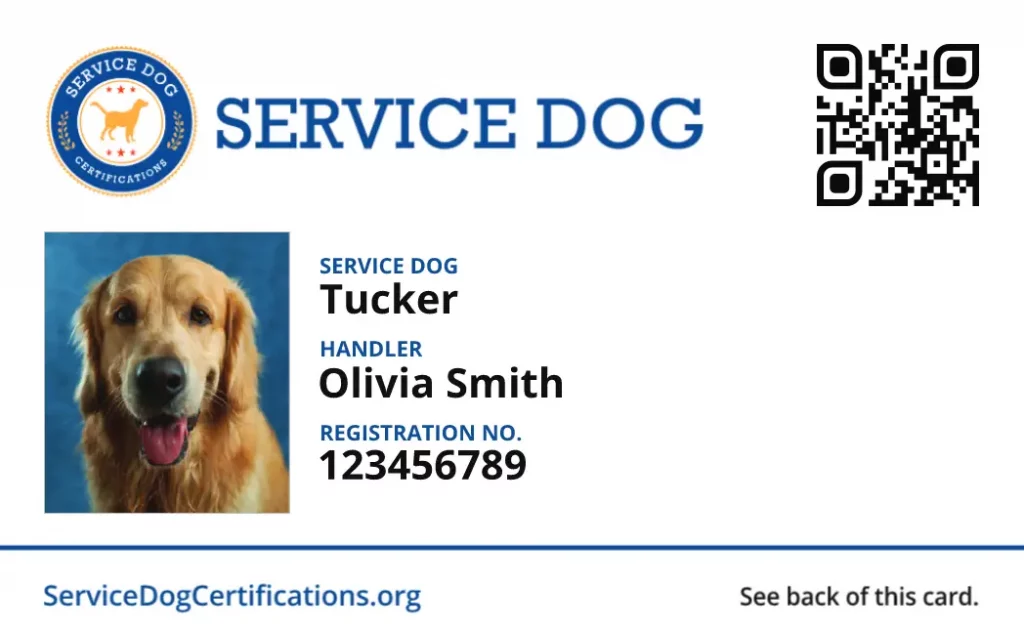Key Takeaways
Under the ADA, businesses can only ask two questions about your service dog: “Is the dog a service animal required because of a disability?” and “What work or task has the dog been trained to perform?”
You are not legally required to provide documentation, certification, or proof of your service dog’s status.
Service dogs are not required to wear vests, tags, or any form of identification.
Being informed about your rights can help you confidently address any misunderstandings or refusals of service.
Empowering yourself with knowledge of service dog laws can improve public experiences for both you and your service dog.
Service Dog Documentation: What You Need to Know
Imagine walking into a restaurant with your service dog, only to be stopped and asked for papers proving your dog’s status. It can be frustrating, right? But here’s the thing: knowing your rights can turn these encounters into opportunities for education and empowerment. Let’s dive into what you need to know about service dog documentation and legality.
“California Service Dog Requirements” from www.servicedogcertifications.org and used with no modifications.
Legal Rights and Protections for Service Dog Owners
First and foremost, it’s crucial to understand the legal framework that protects service dog handlers. The Americans with Disabilities Act (ADA) is your shield. This federal law ensures that individuals with disabilities have equal rights and access to public places. Under the ADA, service dogs are recognized as working animals, not pets, and they assist individuals with various tasks related to their disabilities.
The ADA provides clear guidelines on what businesses and organizations can and cannot do when it comes to service dogs. Knowing these rights empowers you to navigate public spaces confidently.
Questions Businesses Can Legally Ask
Businesses often face confusion about how to approach service dog handlers. However, the ADA simplifies this by allowing only two specific questions:
Is the dog a service animal required because of a disability?
What work or task has the dog been trained to perform?
These questions help determine if the dog is a legitimate service animal without delving into personal or private matters. Importantly, businesses cannot ask for documentation, demand the dog demonstrate its task, or inquire about the nature of the handler’s disability.
Understanding Service Dog Identification Papers
Let’s clear up a common misconception: service dogs are not required to have identification papers, certification, or special vests. While some handlers choose to use these for convenience or to avoid questions, they are not legally mandated. The ADA does not recognize any official certification for service dogs.
If someone asks you for papers or proof, you can confidently inform them that the law does not require such documentation. This understanding can help prevent unnecessary conflicts and misunderstandings.
Dealing With Misunderstandings in Public
Misunderstandings can happen, especially in places where service dog laws are not well understood. It’s essential to handle these situations calmly and assertively. Here are some tips:
Politely explain your rights under the ADA.
Use the opportunity to educate others about service dog laws.
Stay calm and composed, even if the situation is frustrating.
If necessary, ask to speak with a manager or higher authority.
By approaching these situations with patience and knowledge, you not only protect your rights but also contribute to broader awareness and understanding of service dog regulations.
Prohibited Inquiries and Actions
When it comes to service dogs, there are specific inquiries and actions that are strictly prohibited by law. Businesses and individuals cannot ask for details about the handler’s disability. This is private information, and no one has the right to demand it. They also cannot ask for medical documentation or a doctor’s note to prove the need for a service dog.
Furthermore, businesses cannot require a service dog to demonstrate its task as a condition for entry. This is not only unnecessary but also potentially disruptive to the handler and the service dog. The law is designed to protect the dignity and privacy of individuals with disabilities, ensuring they are not subjected to intrusive questioning or actions.
Identification and Certification Myths
There’s a lot of confusion surrounding the idea of service dog identification and certification. Many people believe that service dogs must carry some form of official identification or certification, but this is a myth. Let’s debunk some of these misconceptions:
Service dogs do not need to wear vests or special harnesses.
There is no official certification required for service dogs in the United States.
Handlers are not obligated to carry any paperwork proving their dog’s status.
Understanding these facts is crucial for both service dog handlers and the public. It helps to prevent unnecessary conflicts and ensures that the rights of individuals with disabilities are respected.
Many online services claim to provide “official” service dog certification, but these are often scams. The ADA does not recognize any certification or registration for service dogs. Therefore, purchasing such documents is unnecessary and does not confer any legal rights.
No Requirement for Papers or Certification
One of the most important things to remember is that there is no legal requirement for service dog papers or certification. The ADA is clear on this point: service dogs do not need to have any form of identification or proof of their status. This is designed to make it easier for individuals with disabilities to access public spaces without unnecessary barriers.
Some handlers choose to use vests or ID cards to avoid questions, but this is entirely optional. The decision to use identification is a personal choice and not a legal obligation.
Here’s a real-world example to illustrate this point:
“Lisa, a service dog handler, often visits her local grocery store. One day, a new employee asked her for papers proving her dog’s status. Lisa calmly explained that under the ADA, no such papers are required. She then shared a pamphlet about service dog rights with the employee, turning a potentially awkward situation into an educational moment.”
Common Misconceptions and Clarifications
Misunderstandings about service dog laws are common, and they can lead to uncomfortable situations. One misconception is that service dogs are the same as emotional support animals (ESAs). However, ESAs do not have the same access rights as service dogs under the ADA.
Another common myth is that service dogs must be professionally trained. While professional training can be beneficial, it is not a legal requirement. Handlers can train their service dogs themselves, as long as the dog is capable of performing tasks related to the handler’s disability.
How to Approach Verification Requests
When someone asks for verification of your service dog’s status, it’s important to handle the situation with confidence and composure. Here are some steps you can take:
Politely inform them that the ADA does not require service dog papers or identification.
Explain the two questions they are allowed to ask, as outlined by the ADA.
Offer to provide educational materials about service dog laws if you have them available.
If the situation escalates, calmly ask to speak with a manager or higher authority.
By approaching these situations with knowledge and patience, you can help educate others and protect your rights as a service dog handler.
Tips for Navigating Public Spaces
As a service dog handler, navigating public spaces can sometimes be challenging. However, with the right strategies, you can make these experiences more positive and less stressful.
Effective Communication Strategies
Communication is key when it comes to interacting with others about your service dog. Here are some tips to help you communicate effectively:
First, be clear and concise when explaining your rights. Use simple language to ensure that others understand the legal protections you have under the ADA. Second, stay calm and composed, even if the situation becomes tense. Your demeanor can influence how others perceive and respond to you.
Additionally, consider carrying educational materials about service dog laws. These can be helpful tools for informing others and preventing misunderstandings.
Resolving Conflicts Peacefully
Conflicts can arise, but they don’t have to escalate. When faced with a challenging situation, try to remain calm and respectful. Listen to the other person’s concerns, and then calmly explain your rights and the role of your service dog.
If the situation does not improve, ask to speak with someone in a higher position, such as a manager. Often, they will have a better understanding of service dog laws and can help resolve the issue.
Educating Others on Service Dog Rights
One of the most powerful things you can do as a service dog handler is to educate others. By sharing your knowledge and experiences, you can help increase awareness and understanding of service dog laws.
Consider volunteering to speak at local businesses or community events about service dog rights. You can also use social media platforms to share information and resources with a broader audience.
Through education, you can help create a more inclusive and understanding society for service dog handlers and individuals with disabilities.
Benefits of Understanding Service Dog Laws
Understanding service dog laws isn’t just about knowing your rights—it’s about empowerment. With knowledge, you can confidently navigate public spaces, educate others, and advocate for the service dog community. Let’s explore how this understanding benefits you and your service dog.
Empowerment Through Knowledge
Knowledge is power, and when it comes to service dog laws, being informed gives you the confidence to handle any situation. Whether you’re asked intrusive questions or denied access, knowing your rights allows you to respond assertively and educate others. This empowerment extends beyond just you; it impacts the broader service dog community by fostering awareness and understanding.
Improving Experiences for Owners and Dogs
With a clear understanding of service dog laws, your experiences in public spaces can become more positive and less stressful. You’ll know exactly what to say when someone questions your service dog, and you’ll be prepared to handle any misunderstandings calmly. This not only benefits you but also ensures your service dog can focus on their important tasks without distraction.
Advocacy for the Service Dog Community
By understanding and sharing service dog laws, you become an advocate for the community. Your knowledge helps dispel myths and misconceptions, paving the way for greater acceptance and inclusion. As more people understand the legal protections for service dogs, the community as a whole benefits from increased support and reduced stigma.
Moreover, advocating for service dog rights can lead to policy changes and improved accessibility. Your efforts contribute to a more inclusive society where individuals with disabilities and their service dogs can thrive.
Frequently Asked Questions
Service dog laws can be complex, and it’s natural to have questions. Here are some of the most common inquiries, along with clear, concise answers to help you navigate any uncertainties.
Can businesses require proof of my service dog’s certification?
No, businesses cannot require proof of certification for your service dog. The ADA does not mandate any form of certification or identification for service dogs. Businesses are limited to asking two questions: whether the dog is a service animal required because of a disability and what tasks the dog is trained to perform. Understanding this helps you assert your rights and educate others when necessary.
What should I do if someone asks for service dog papers?
If someone asks for service dog papers, politely inform them that such documentation is not required by law. You can reference the ADA guidelines, which clearly state that service dogs do not need to have identification papers. Here’s a simple way to handle the situation:
“Thank you for your concern, but according to the ADA, service dogs are not required to have identification papers. I’m happy to answer the two questions allowed by law: my dog is a service animal, and they assist me with tasks related to my disability.”
By responding calmly and providing factual information, you can help prevent conflicts and promote understanding.
Are service dogs required to wear special vests or tags?
No, service dogs are not required to wear special vests, tags, or any form of identification. While some handlers choose to use vests to avoid questions, it is not a legal requirement. The focus is on the tasks the service dog performs, not on their appearance or attire. Knowing this helps you and your service dog move freely without unnecessary barriers.
How should I respond to incorrect refusals of service?
Encountering a refusal of service can be frustrating, but handling it calmly and assertively is key. Here are steps you can take:
Politely explain your rights under the ADA and the role of your service dog.
Request to speak with a manager or higher authority who may be more informed.
Offer to provide educational materials about service dog laws if available.
If the issue persists, consider filing a complaint with the Department of Justice or seeking legal advice.
By addressing refusals with knowledge and patience, you can protect your rights and contribute to a more informed and inclusive society.






